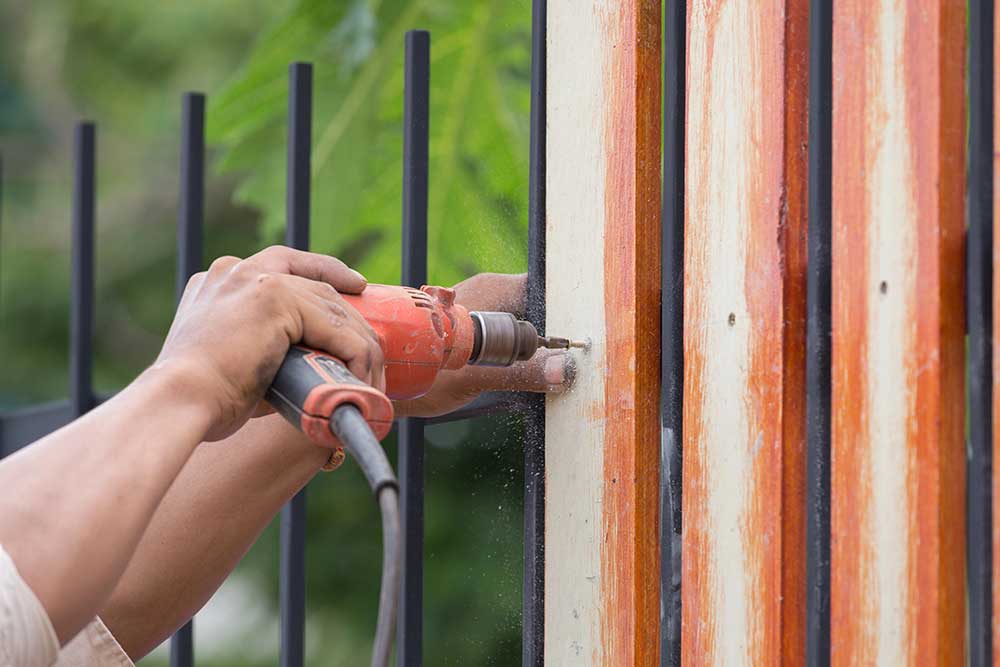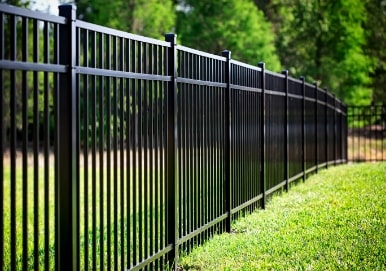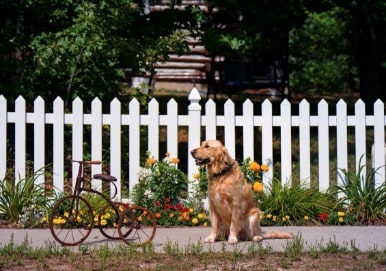Just as you wouldn’t build a house without a solid foundation, it’s important not to build a wood fence without choosing the right screws. While it may be easy to overlook, selecting the wrong screw size can lead to a variety of issues down the road.
From warping to compromising the overall strength of your fence, incorrect fasteners can create problems that are best avoided. So, what size screws for a wood fence should you choose? We’re here to guide you in selecting the perfect size to keep your fence strong, secure, and looking great for years to come.

What Size Screws for a Wood Fence: Factors that Determine
Selecting the correct screw depends on several factors. The thickness of the wood, the fence type, and exposure to the elements all influence the choice.
A balance between length and diameter keeps boards tight without splitting the material. The right screws must penetrate deep enough to hold sections together while resisting pullout over time.
The climate also plays a role in determining the best screw material. High-humidity areas or coastal regions require rust-resistant fasteners to prevent premature failure. Soil movement and wind exposure can also stress a fence. This makes proper screw selection even more critical for long-term stability.
Screw Length for Different Fence Sections
Each fence component requires a different screw length. Posts, rails, and pickets all have varying thicknesses – which impacts fastener selection. Using the wrong length can compromise stability and weaken the structure over time.
- Posts and Rails
Connecting rails to posts requires long screws for a stronghold. A 3.5-inch to 4-inch screw works well for securing rails to wooden posts. This length allows for deep penetration into the post and keeps the rails from shifting. For pressure-treated lumber, slightly longer screws may be necessary to compensate for shrinkage as the wood dries.
Using screws with a coarse-thread design enhances grip and prevents loosening over time. Structural screws, rather than traditional wood screws, offer better load-bearing capacity for horizontal rails. These rails bear the weight of fence panels or pickets.
- Pickets and Panels
Attaching pickets or pre-assembled panels to rails needs shorter screws. A 1.5-inch to 2-inch screw is usually sufficient. This size prevents over-penetration while keeping boards secure.
For thicker pickets, longer screws may be necessary. If using a fence panel system, penetrating the screws at least halfway through the picket into the rail helps maintain long-term stability.
Fences built with cedar or redwood require corrosion-resistant screws since these woods contain natural oils that can accelerate metal corrosion. Opting for screws with protective coatings means they do not deteriorate prematurely.
Choosing the Right Diameter
The diameter, or gauge, of the screw determines its holding strength. Thicker screws increase durability. However, going too thick may cause splitting. A #8 or #9 screw works well for most fencing projects. When securing heavy panels, a #10 screw brings extra holding power.
For fence gates, even thicker screws (such as #12 or #14) may be required to handle repeated movement and stress. In these cases, screws with reinforced heads help prevent stripping during tightening and offer a firm hold over time.
Screw Material and Coating
Since fences endure outdoor conditions, screws must resist rust and corrosion. Stainless steel and coated screws hold up best against moisture and temperature changes.
- Galvanized Screws
A cost-effective option with a protective zinc layer. These resist rust but may corrode in extreme moisture. Hot-dipped galvanized screws last longer than electro-galvanized ones because they have a thicker coating that withstands weather exposure.
- Stainless Steel Screws
Deliver superior rust resistance and durability. These work well in humid or coastal areas but come at a higher price. They prevent staining and weakening caused by wood tannins. This makes them ideal for cedar and redwood fences.
- Exterior-coated Screws
Feature a polymer or ceramic coating for added protection. These resist weathering better than standard steel fasteners. They offer a middle ground between galvanized and stainless steel in terms of performance and cost.
Avoiding Common Screw Mistakes
Using incorrect fasteners can weaken the fence. Short screws may loosen over time. Meanwhile, long screws can split boards. Poor-quality materials corrode quickly and lead to failure. Fence installation services pre-drill holes to prevent the wood from cracking, especially in hardwoods.
Proper spacing allows for even load distribution and reduces the chance of weak points. Driving screws too deep weakens the wood and increases moisture retention. Keeping screws flush with the surface maintains strength and prevents unnecessary damage to the fence material.
Checking screw alignment before securing panels prevents skewing. This can affect the overall fence structure. Uneven fastening can cause gaps between boards and reduce privacy and stability.
When to Use Nails Instead of Screws
While screws provide a stronger hold, nails work better in some cases. If the fence requires flexibility, nails allow for slight movement without breaking. Galvanized ring-shank nails offer good grip and resist pullout.
However, screws perform better for sections under continuous stress, such as gates and rails. They prevent the loosening that occurs with nailed joints over time. Using a combination of nails for pickets and screws for structural components balances strength and flexibility.
Reinforcing Fence Stability with Screws
Fence posts endure the most stress and make screw placement critical. Using lag screws or structural screws for added reinforcement keeps posts anchored in place. Attaching brackets or braces to high-stress areas strengthens connections and reduces the risk of sagging or failure.
Securing horizontal rails with multiple screws on each end increases structural integrity. Using two screws per picket attachment point prevents twisting or warping as the fence settles over time. Reinforcing gates with additional screws at hinge points prevents sagging and maintains proper alignment.
Maintaining a Fence with the Right Screws
Choosing high-quality screws prevents frequent repairs. Checking for loose fasteners and replacing rusted screws extends the fence’s life. Seasonal inspections help catch small issues before they turn into major problems.
If wood swells due to moisture, loosening screws slightly and retightening after drying maintains tension without causing cracks. Using replacement screws of equal or better quality prevents weak points from developing.
Trust Good Neighbor Fence for Expert Wood Fence Installation in Richmond, VA
A fence is only as strong as the materials holding it together. Choosing the right screws—ones with the ideal length, diameter, and corrosion-resistant material—means your wood fence stays sturdy for years to come.
Good Neighbor Fence knows that high-quality materials make all the difference. Since 2006, our locally owned and operated team has helped Richmond, VA, homeowners, and businesses build durable, beautiful fences designed to stand the test of time. From premium wood selections to the perfect fasteners, we pay attention to every detail so you don’t have to.
Looking to upgrade or go with a new fence type? With financing options starting at 0% APR and workmanship warranties for new installations, it’s easier than ever to invest in a secure, long-lasting fence without breaking the bank.
Call us today at (804) 737-4664 or request a free quote online to get started. Our team is ready to help you build a fence that’s built to last.





